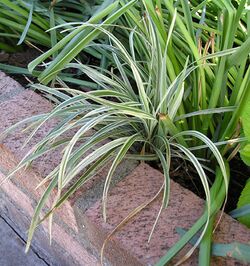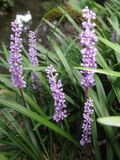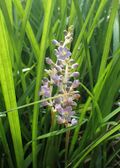Biology:Liriope (plant)
| Lilyturf | |
|---|---|

| |
| Young variegated Liriope spicata | |
| Scientific classification | |
| Kingdom: | Plantae |
| Clade: | Tracheophytes |
| Clade: | Angiosperms |
| Clade: | Monocots |
| Order: | Asparagales |
| Family: | Asparagaceae |
| Subfamily: | Nolinoideae |
| Genus: | Liriope Lour. |
| Synonyms[1] | |
|
Globeria Raf. | |
Liriope is a genus of low, grass-like flowering plants from East and Southeast Asia.[1][2]
Some species are often used in landscaping in temperate latitudes. It may be called "lilyturf" in North America, although it is neither a true grass (family Poaceae) nor a lily (genus Lilium). In the APG III classification system, it is placed in the family Asparagaceae, subfamily Nolinoideae (formerly the family Ruscaceae[3]). Like many lilioid monocots, it was once classified with lilies in the family Liliaceae; it has also been placed in the former family Convallariaceae. The genus was named for the nymph Liriope of Greek mythology.
Background and pronunciation
Liriope are usually used in the garden for their evergreen foliage as a groundcover. Some species, e.g., L. spicata, grow aggressively in the right conditions, spreading by runners; hence their nickname, "creeping lilyturf".
In the southeastern United States Liriope is sometimes referred to by the common name monkey grass or spider grass.
The pronunciation of "Liriope" varies. Commonly recommended pronunciation are /lɪˈraɪəpi/ lih-RY-ə-pee (US),[4][5] and /lɪəˈriːoʊpeɪ/ leer-EE-oh-pay (British),[6] but there are many regional variations. In the southern United States, for example, it may be pronounced /ˈlaɪroʊpi/ LY-roh-pee, /lɪəˈraɪoʊpi/ leer-EYE-oh-pee, or /ˈlɪərioʊp/ LEER-ee-ohp.
Cultivation
Liriope muscari is perhaps most widespread in cultivation and is considered appropriate for USDA Hardiness Zones 6-10.[7]
Spikes of tiny violet-blue flowers appear in late summer, and will be more prolific with a dose or two of fertilizer early in the season. A number of variegated varieties are now available to add golden or silver flashes of color to shady situations.
Species
| Image | Name | Distribution |
|---|---|---|
| Liriope graminifolia (L.) Baker | Philippines; widespread across much of China | |
| Liriope kansuensis (Batalin) C.H.Wright | Sichuan, Gansu | |
| Liriope longipedicellata F.T.Wang & Tang} | Sichuan | |
 |
Liriope minor (Maxim.) Makino | Japan, Ryukyu Islands, widespread across much of China |
 |
Liriope muscari (Decne.) L.H.Bailey | Japan, Korea, widespread across much of China |
 |
Liriope spicata Lour. | Japan, Ryukyu Islands, Korea, widespread across much of China |
References
- ↑ 1.0 1.1 Kew World Checklist of Selected Plant Families
- ↑ Flora of China, Vol. 24 Page 250, 山麦冬属 shan mai dong shu, Liriope Loureiro, Fl. Cochinch. 1: 190, 200. 1790.
- ↑ Chase, M.W.; Reveal, J.L.; Fay, M.F. (2009), "A subfamilial classification for the expanded asparagalean families Amaryllidaceae, Asparagaceae and Xanthorrhoeaceae", Botanical Journal of the Linnean Society 161 (2): 132–136, doi:10.1111/j.1095-8339.2009.00999.x
- ↑ Sunset Western Garden Book, 1995:606–607
- ↑ "Liriope". Merriam-Webster Dictionary. https://www.merriam-webster.com/dictionary/Liriope. Retrieved 2016-01-23.
- ↑ Coombes, Allen J. (1994). Dictionary of Plant Names. London: Hamlyn Books. p. 108. ISBN 978-0-600-58187-1.
- ↑ Hortus III, Liberty Hyde Bailey Hortorium, 1976
Wikidata ☰ Q1065926 entry
 |

